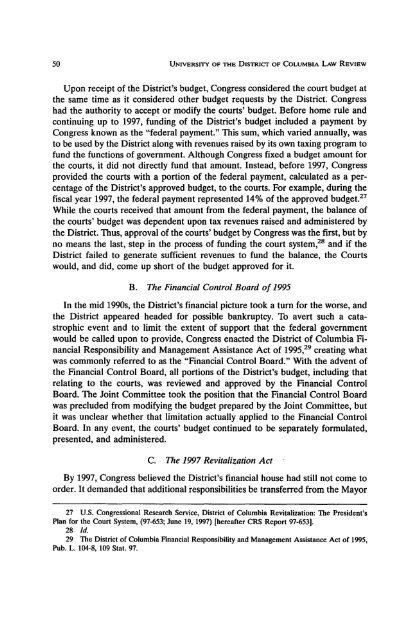Download Electronic Version - UDC Law Review
Download Electronic Version - UDC Law Review
Download Electronic Version - UDC Law Review
You also want an ePaper? Increase the reach of your titles
YUMPU automatically turns print PDFs into web optimized ePapers that Google loves.
50 UNIVERSITY OF THE DISTRICT OF COLUMBIA LAW REVIEW<br />
Upon receipt of the District's budget, Congress considered the court budget at<br />
the same time as it considered other budget requests by the District. Congress<br />
had the authority to accept or modify the courts' budget. Before home rule and<br />
continuing up to 1997, funding of the District's budget included a payment by<br />
Congress known as the "federal payment." This sum, which varied annually, was<br />
to be used by the District along with revenues raised by its own taxing program to<br />
fund the functions of government. Although Congress fixed a budget amount for<br />
the courts, it did not directly fund that amount. Instead, before 1997, Congress<br />
provided the courts with a portion of the federal payment, calculated as a percentage<br />
of the District's approved budget, to the courts. For example, during the<br />
fiscal year 1997, the federal payment represented 14% of the approved budget. 27<br />
While the courts received that amount from the federal payment, the balance of<br />
the courts' budget was dependent upon tax revenues raised and administered by<br />
the District. Thus, approval of the courts' budget by Congress was the first, but by<br />
no means the last, step in the process of funding the court system,28 and if the<br />
District failed to generate sufficient revenues to fund the balance, the Courts<br />
would, and did, come up short of the budget approved for it.<br />
B. The Financial Control Board of 1995<br />
In the mid 1990s, the District's financial picture took a tum for the worse, and<br />
the District appeared headed for possible bankruptcy. To avert such a catastrophic<br />
event and to limit the extent of support that the federal government<br />
would be called upon to provide, Congress enacted the District of Columbia Financial<br />
Responsibility and Management Assistance Act of 1995,29 creating what<br />
was commonly referred to as the "Financial Control Board." With the advent of<br />
the Financial Control Board, all portions of the District's budget, including that<br />
relating to the courts, was reviewed and approved by the Financial Control<br />
Board. The Joint Committee took the position that the Financial Control Board<br />
was precluded from modifying the budget prepared by the Joint Committee, but<br />
it was unclear whether that limitation actually applied to the Financial Control<br />
Board. In any event, the courts' budget continued to be separately formulated,<br />
presented, and administered.<br />
C. The 1997 Revitalization Act<br />
By 1997, Congress believed the District's financial house had still not come to<br />
order. It demanded that additional responsibilities be transferred from the Mayor<br />
27 U.S. Congressional Research Service, District of Columbia Revitalization: The President's<br />
Plan for the Court System, (97-653; June 19, 1997) [hereafter CRS Report 97-653].<br />
28 ld.<br />
29 The District of Columbia Fmancial Responsibility and Management Assistance Act of 1995,<br />
Pub. L. 104-8, 109 Stat. 97.














